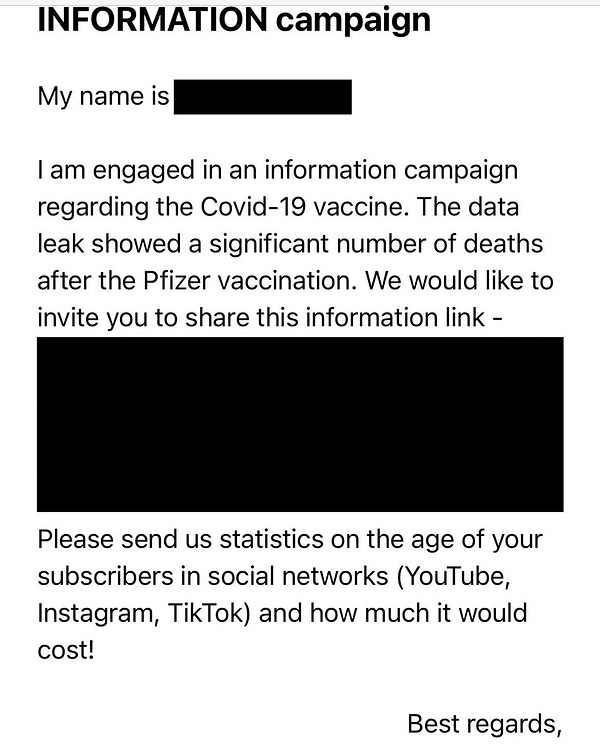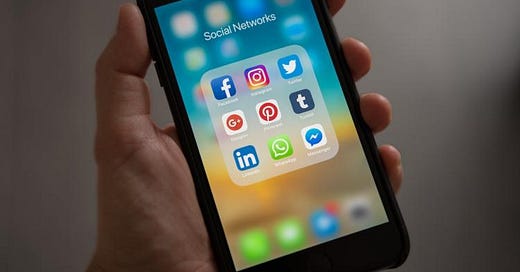Dear Friends
I hope you all are safe and healthy.
Throughout this week, every time I went on the internet, I only saw posts, articles, hashtags about the social media ban, and various opinions about it. Even I wrote a piece about it! Although I knew for a fact that social media platforms won’t be banned after 25th may, I could understand why people were in such fear and suspicion, especially because many people had already tasted the bitter taste of the sudden TikTok ban. But things are not so simple this time around. To begin with, TikTok was an individual social media platform that purged mainly because of its country of origin.
But there are a thousand other reasons as to why an all-encompassing ban is an improbable possibility.
And the more I thought about it, the more complex this issue became. So here I am, trying to make sense of all the elements at play in the hope that by the end of this newsletter, you and I both can find some answers.
Let me start from the counter-narrative because there seems to be a lack of balance here.
Why did the government issue those guidelines?
The simple answer is the Government feels that these social media platforms are not capable of self-regulation. In the words of the Government, “Some very disturbing developments are observed on social media platforms. The persistent spread of fake news has compelled many media platforms to create fact-check mechanisms. Instances of the use of abusive language, defamatory and obscene content, and blatant disrespect to religious sentiments through platforms are growing. Over the years, the increasing instances of misuse of social media by criminals and anti-national elements have brought new challenges for law enforcement agencies. These include inducement for recruitment of terrorists, circulation of obscene content, the spread of disharmony, financial frauds, incitement of violence, public order, etc.”
The Government further feels that citizens often fail to protect their rights because of structural inefficiencies of these platforms, which delay investigation and complicate the process. Thus the Government wants these platforms to create intermediary categories, Indian representative officials, grievance redressal mechanisms, etc, in their administration if they're going to continue their platforms here.
These concerns of the Government are not entirely unfounded. I am an ardent defender of social media, and I always will be. Still, the very qualities of social media as a facilitator of accessibility, communication, and inclusion that make it so valuable are also qualities that indirectly make people and sovereign states vulnerable. Opinions are made and manipulated, and by sheer virtue of volume and influence, internet opinions can lead to crucial socio-political upheavals.
Recently, European YouTubers, bloggers, and influencers were provided with money from a UK-based PR agency with Russian connections to claim that Pfizer vaccines lead to higher mortality rates falsely.


According to Guardian, “The influencers were told to publish links on YouTube, Instagram or TikTok to reports in Le Monde, on Reddit and on the Ethical Hacker website about a leaked report containing data that supposedly substantiates the claim.
The article in Le Monde is about data reportedly stolen by Russian hackers from the European Medicines Agency and later published on the Dark Web. It contains no information on mortality rates. The pages on the other two sites have been deleted.”
We already know that people are skeptical about vaccines. Governments and organizations worldwide are repeatedly doing campaigns and awareness programs to incentivize more people to take vaccines. It would take only a false tweet, a negative blog for things to go haywire. We already have a load of conspiracy theories, and I don’t think we need any more of that.
Social media does need some form of regulation from a national and public interest point of view. I am sure you recall the gory images of rioters attacking the U.S Capitol building in January. Facebook was at the center of the chaos and rightly blamed for allowing extremist accounts and pages to operate and spread hate. Many disinformation specialists at BBC (yes, that's a thing now. Internet, what have you done?) believe that it was the climax of months of social media conspiracy theories. Responding and analyzing the riots, CNN Business wrote, “The incoming administration should establish a task force to study the harms of disinformation on social media; launch a website to combat viral disinformation and appoint an expert on disinformation to the Covid-19 task force — this person would be in charge of coordinating a national response.”
It further suggested, “Congress should also pass legislation requiring social media and technology companies to enhance the transparency of their content moderation processes, conduct periodic risk assessments that look at how their rules and recommendations may help spread deceptive propaganda and other harmful content and explore suitable mitigation strategies in cooperation with government agencies, experts, consumer associations and civil society groups.” I don’t see any fault in these suggestions. If we hold on to this perspective, then we will realize that the Government too is acting on similar lines to uphold peaceful functioning in the country and establish proper supervision.
Having said that, I do realize that there’s another side to the story. The Government is notoriously famous for suppressing voices of dissent, and many fear that these guidelines are a step forward in that direction. One can recall the recent farmers' protest and how Facebook took down Kisan Ekta Morcha’s page to “counter misinformation '' when it was a move to dismantle the momentum of the cause.
There are also fears amongst people that we are heading towards a surveillance state. And the recent interaction between WhatsApp and the Government upholds these fears. WhatsApp recently issued a statement responding to the guidelines that, “Requiring messaging apps to ‘trace' chats is the equivalent of asking us to keep a fingerprint of every single message sent on WhatsApp, which would break end-to-end encryption and fundamentally undermines people's right to privacy” The Government defended its claim saying they want to know the origin of a particular text-only “when the message is required for Prevention, Investigation or Punishment of Very Serious Offences related to the sovereignty and integrity of India, the security of the State, friendly relations with foreign states, or public order, or of incitement to an offense relating to the above or in relation with rape, sexually explicit material or child sexual abuse material” If we take the Government at word value, then we will realize that there’s no absolute right or wrong here. Everyone is trying to protect their digital rights and freedom of speech. The Government, too, claims to act in the same conscience. So any debate prioritizing only one side of the argument is futile. Both sides are relatively correct.
Okay, so now that we are done with the two opposing perspectives, let's boil down this complex crisis keeping aside the intentions and arguments. Let's judge the very idea itself. Can social media be banned? Is it possible for a country with 624.0 million internet users and 448 million social media users to ban it all?
Let's think from a capitalist point of view first because we live in a capitalist economy.
The whole point of these big social media giants is to maximize profits and capture markets. None of the platforms would give up on the market as thriving and as big as India no matter what structural and administrative changes they are faced with. They will always comply, if not eagerly, then by negotiation and settlements. So, no matter what the Government demands, they will follow suit as long as they make profits.
Another point of consideration is that the thriving digital economy in India is based upon global influencer marketing, which was estimated to be 9.7 billion dollars in 2020. If the Government were to ban social media platforms, the economy would crash. Moreover, such a ban will be borne by big companies and firms who invest heavily in marketing and small independent businesses and creators. It will also heavily hamper production and distribution channels in the country as aftermath. Needless to say, all content creators, digital media houses, publications will be out of business. So any move banning social media will probably make millions unemployed, which is too big a price a government would want to pay. Rather the Government won't be able to pay.
But the most important of all reasons is the socio-cultural reason. Social media is no longer an alternate reality for us. It dominates our day-to-day life; it is ingrained in our socio-cultural imagination. The internet and social media have immense utilitarian value in our life which we often overlook. And it is not only the privileged upper-class metropolitan elite at stake here now. Our domestic help video calls their family members in their hometown over WhatsApp while doing the chores. This is just one example, but millions of people from tier 2 & 3 cities from economically lower backgrounds who can afford information, communication, and myriad other opportunities just because of social media. And given the pandemic, the role of social media is more crucial than ever in our lives.
There are 530 million WhatsApp users in India. What do you think will happen if the Government decides to ban WhatsApp one day? Do you believe that these 530 million people will simply shift to Signal or any other Indian alternative for that matter? No! I think there will be colossal chaos. At least a dozen million of them will be out on the streets protesting. It will be impossible to reconcile half a billion people. For the first time in decades, social media provides millions across the country with an equal playing field. The internet, for millions, is the only source of liberation, expression, and realization. They won’t let it slip off so easily. Therefore, when I say that a ban can’t happen, the people won’t let it happen.
Take care and stay safe.
If you liked reading this, feel free to forward it to your friends.





Yes it dominates. This piece makes me remember how I was awake late at night that day just check whether social media is available or not.. Lol... Ghabrahat! Stay safe...